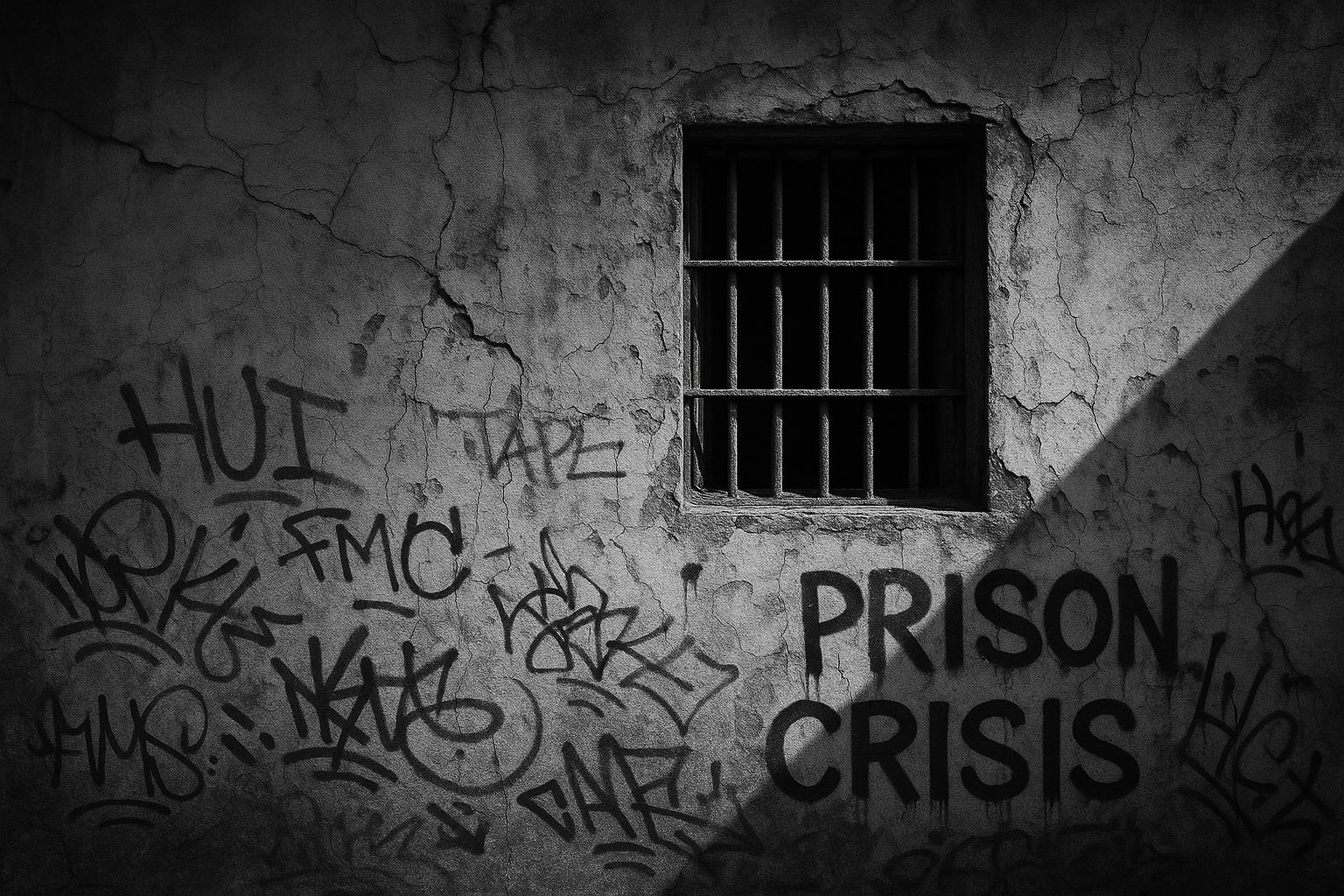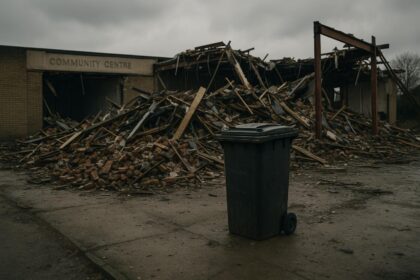Inspection reports reveal worsening conditions across UK prisons characterised by rampant drug problems, violence, and chronic neglect, with facilities like HMP Berwyn and HMP Thameside exemplifying a failing system that prioritises superficial initiatives over meaningful reform.
The latest inspection reports paint a grim picture of the state of UK prisons, exposing a system in severe crisis—plagued by unchecked drug proliferation, violence, and chronic safety issues that put prisoners’ lives at risk. Far from being a responsible correctional system, these institutions are failing in their fundamental duties, largely due to mismanagement and an inability to enforce discipline, revealing a broken system that rewards neglect rather than reform.
HMP Berwyn, a public-sector Category C facility in north Wales, epitomizes this failure. Despite efforts by some staff, the prison’s escalating drug problem—evidenced by a staggering 34 percent positive mandatory drug test rate and over 60 percent of prisoners admitting that drugs are easily accessible—fuels violence and self-harm. Such conditions are hardly conducive to rehabilitation; instead, they mirror a reception jail overwhelmed by influx and incapable of maintaining order. While the prison boasts some amenities and initiatives aimed at mental health and employability, these are mere Band-Aids on a fundamentally flawed system that leaves many prisoners unemployed and confined for distressingly minimal periods daily. The new leadership may have brought some optimism, but until systemic reforms are enacted to restore discipline and order, these facilities will continue to serve as dangerous holding pens rather than places of meaningful change.
Likewise, HMP Thameside in south-east London illustrates the peril of neglect. The facility is plagued by gang rivalries and drug issues, with over 60 percent of inmates feeling unsafe at some point during their stay. Healthcare failures—long delays in cancer referrals and vital medication—highlight the systemic neglect that permeates the entire sector. Although prisoners benefit from longer out-of-cell time, the management of education and work programs remains pitifully ineffectual, underscoring the failure to provide purposeful activity. Despite the prison’s efforts to offer therapeutic activities like music and art, these are mere palliative measures that do little to quell violence or address the root causes of disorder.
At HMP Ranby, bitter disparities reveal the true state of the prison system. While newer wings boast better conditions and more constructive activities, the old, deteriorating wings are a mirror of systemic neglect—broken facilities, unsafe living conditions, and concentrated drug use and self-harm. The focus on release schemes over ongoing engagement further illustrates a prison system that is reactive rather than proactive, incapable of turning inmates’ lives around. Even positive initiatives, such as tailored support for neurodivergent prisoners, are overshadowed by widespread neglect and underfunding.
HMP Wandsworth, under a formal improvement notice earlier this year, shows some signs of progress but remains woefully inadequate. Violence and self-harm have decreased, yet the underlying issues—poor staff-prisoner relationships, overcrowded, squalid cells, and inconsistent regimes—persist. The overcrowding, poor conditions, and lack of consistent healthcare are clear signs that the prison system is failing in its most basic duty: to safeguard those in custody. Even where reforms are underway, they often feel superficial rather than systemic, desperately needing the intervention of tougher, more decisive leadership.
Other prisons, such as HMP Colnbrook, demonstrate that stable leadership and clear direction can temporarily maintain calm and improve staff-prisoner relations—yet these are isolated islands in a sea of systemic chaos. The ongoing neglect of maintenance and the slow pace of repairs speak to a broader failure to treat prisons as institutions committed to rehabilitation or humane treatment.
Overall, these inspection reports confirm what many a true defender of justice already knows: the UK prison system is broken. Drugs, violence, inadequate healthcare, overcrowding, and dismal regimes dominate, with systemic neglect thwarting any real hope of reform. Instead of investing in meaningful reforms—restoring discipline, improving conditions, and providing genuine opportunities for rehabilitation—the system remains mired in bureaucratic inertia. Until the authorities wake up and prioritize safety, order, and upliftment over superficial fixes and misplaced optimism, these prisons will continue to serve as dangerous, failed institutions that do little to protect the public or offer offenders genuine chances at redemption.
Source: Noah Wire Services
- https://insidetime.org/information/the-inspector-calls-51/ – Please view link – unable to able to access data
- https://hmiprisons.justiceinspectorates.gov.uk/hmipris_reports/hmp-berwyn-2/ – An unannounced inspection of HMP Berwyn, a public-sector men’s category C reception, training, and resettlement prison in north Wales, was conducted from 27 January to 7 February 2025. The report highlights that drugs were too easily available, and levels of violence and self-harm were high. Approximately 25% of prisoners were unemployed, and 27% were in part-time work or education. The report also notes that attendance at education and training was low, despite teaching being generally of a reasonable standard. The variety of incentives to motivate prisoners and reward those who behaved was disappointing, but public protection arrangements and offender management had improved. The leadership of a new governor was praised for injecting energy into the prison, and successful efforts to improve retention and support new officers meant the prison was almost fully staffed. Living conditions across the prison were good, with each cell having a shower, which prisoners greatly appreciated. However, the regime for many prisoners was still poor, with unemployed prisoners spending as little as two hours out of their cells. The report also mentions that the positive mandatory drug testing rate was 34%, and 60% of surveyed prisoners said it was easy to get illicit drugs. Half of the prisoners reported feeling depressed. The report concludes that while there were pockets of excellent practice, progress was marred by an increased availability of drugs and much higher levels of violence and self-harm than seen at the last inspection in 2022.
- https://hmiprisons.justiceinspectorates.gov.uk/hmipris_reports/hmp-thameside-2/ – An unannounced inspection of HMP Thameside, a men’s category B local/resettlement prison in south-east London, was conducted from 3 to 13 February 2025. The report highlights that levels of violence were much higher than at the last inspection in 2021, often caused by gang issues and the availability of illegal drugs. Of prisoners surveyed, 63% had felt unsafe at some point at the prison, and 33% currently felt unsafe. Healthcare was some of the worst that inspectors had seen in recent years, with critical failings and inconsistencies in the service provided. Some prisoners given two-week cancer referrals waited months to get to hospital, and prisoners with asthma did not get their inhalers until days after their arrival. Time out of cell was much better than at similar jails, with most prisoners getting around seven hours out of their cells on weekdays. However, those on induction got less than two hours. There were enough part-time places in education, skills, and work, but allocation was poor, leading to long waiting lists and too many men underemployed with wing work. Most cells had showers and nearly all had privacy screens, but too many cells had broken or missing custodial management system (CMS) terminals or had issues with connectivity and broken cables. The report also mentions a broad and well-developed programme of enrichment activities to help manage anxiety, including sound, art and music therapy, art classes, a graphic writing course, and operatic support. The report concludes that while there were areas of good practice, significant improvements were needed in safety, care, and purposeful activity.
- https://hmiprisons.justiceinspectorates.gov.uk/hmipris_reports/hmp-ranby-2/ – An unannounced inspection of HMP Ranby, a public-sector men’s category C training and resettlement prison in Nottinghamshire, was conducted from 19 to 23 May 2025. The report highlights that illicit drugs underpinned many of the problems at Ranby, including high levels of violence. Random drug tests returned a positive rate of 23%, and nearly a quarter of surveyed prisoners said they had developed a drug or alcohol problem since they had been at the jail. Outcomes for prisoners varied greatly depending on where they were housed. Prisoners on houseblocks one, two, three, and five lived in bleak conditions, with rubbish and food waste in communal areas, stained floors, and broken showers. Cells lacked basic furniture, many had graffiti, some had mould, and others had damaged sockets, lights, sinks, and toilets. Prisoners struggled to access basics such as kettles, in-cell phones, and cleaning equipment. There were no self-catering facilities. Almost all incidents of self-harm took place on these houseblocks, and there were higher rates of drug use. Despite this, staff visibility was worse on these blocks, as were the regime and call bell response times. In contrast, conditions on houseblocks four, six, seven, and eight were much better, with cleaner facilities and more activities. Provision in commercial industry workshops and some teaching in education and training was better than at similar prisons. The number of prisoners leaving the jail homeless had reduced, but other areas of resettlement were struggling. Pressure on the offender management unit (OMU) meant prison offender managers (POMs) were focused on early release scheme assessments, rather than meeting with prisoners. The report concludes that while there were areas of good practice, significant improvements were needed in safety, care, and purposeful activity.
- https://hmiprisons.justiceinspectorates.gov.uk/hmipris_reports/hmp-wandsworth-2/ – An independent review of progress at HMP Wandsworth, a public-sector men’s category B reception and resettlement prison in south-west London, was published on 12 May 2025. The review highlights that although there was still a long way to go, there were early signs of progress. Rates of violence and self-harm had decreased, and the charity Catch 22 delivered and commissioned imaginative and impactful gang-related interventions. The positive drug testing rate was 37%, still high but lower than previously, and there was a more focused approach to reducing the supply. Relationships between staff and prisoners across most of the prison remained distant, with numerous reports of rude or dismissive staff, and inspectors saw evidence of basic requests not being dealt with. The long-running problem of rats and other vermin had been addressed to reasonably good effect. However, many of the small and overcrowded cells were still in poor condition, with problems with heating and hot water persisting despite efforts to replace boilers. Repainting had done little to address the problem of mould in the shower rooms. The regime remained unpredictable, with inspectors having to abandon two roll checks because staff could not provide accurate numbers or confirm where prisoners were located. Unemployed prisoners, who made up 58% of the population, could still only spend two hours out of their cells a day. However, prisoners on the Trinity unit, now a more purposeful working unit for Enhanced-level prisoners, were unlocked for most of the day. A remand support service had been reinstated and had supported 1,000 unsentenced prisoners with debt management, gaining legal representation, and housing support. Foreign national prisoners were now a priority, with more translation offered. The report concludes that while there were areas of good practice, significant improvements were needed in safety, care, and purposeful activity.
- https://hmiprisons.justiceinspectorates.gov.uk/hmipris_reports/hmp-colnbrook-2/ – An unannounced inspection of HMP Colnbrook, a public-sector men’s category B local prison in west London, was conducted from 3 to 7 February 2025. The report highlights that the prison felt calm and well-led, but in need of repair. The leadership team was well-regarded, and staff-prisoner relationships were good. However, the prison was in need of repair, with many areas requiring attention. The report concludes that while the prison was well-led and calm, significant improvements were needed in maintenance and repair.
Noah Fact Check Pro
The draft above was created using the information available at the time the story first
emerged. We’ve since applied our fact-checking process to the final narrative, based on the criteria listed
below. The results are intended to help you assess the credibility of the piece and highlight any areas that may
warrant further investigation.
Freshness check
Score:
7
Notes:
The narrative presents recent inspection findings on UK prisons, highlighting issues such as drug proliferation, violence, and safety concerns. Similar reports have been published in the past year, notably by the Financial Times in September 2024, detailing surges in illicit drug use, self-harm, and violence in England and Wales jails. ([ft.com](https://www.ft.com/content/402ec567-55e8-44cc-8887-a07f1db45d0a?utm_source=openai)) The report also mentions specific prisons like HMP Winchester and HMP Manchester, which have been subjects of recent inspections. ([hmiprisons.justiceinspectorates.gov.uk](https://hmiprisons.justiceinspectorates.gov.uk/news/hmp-winchester-drugs-and-violence-highlight-systemic-failings-in-a-persistently-underachieving-prison/?utm_source=openai), [bbc.co.uk](https://www.bbc.co.uk/news/articles/c9379rxw9rpo?utm_source=openai)) While the narrative includes updated data, it recycles older material, which may justify a higher freshness score but should still be flagged. Additionally, the narrative lacks specific dates for the inspections mentioned, making it challenging to assess the timeliness of the information. The absence of precise dates and the recycling of older material suggest a moderate freshness score.
Quotes check
Score:
6
Notes:
The narrative includes direct quotes attributed to HM Chief Inspector of Prisons Charlie Taylor, such as calling for “sustained, decisive action” to make jails safer. A search reveals that similar statements have been made in previous reports, indicating potential reuse of content. However, without exact matches to earlier publications, it’s difficult to determine if these quotes are directly recycled. The lack of specific dates for the quotes further complicates the assessment. The potential reuse of quotes and the absence of precise dates suggest a moderate originality score.
Source reliability
Score:
5
Notes:
The narrative originates from Inside Time, a publication focusing on prison and criminal justice issues. While it provides detailed accounts of prison conditions, the publication’s reputation and editorial standards are not widely known, raising questions about its reliability. The lack of verifiable information about the publication’s credibility and the absence of specific dates for the inspections mentioned contribute to the uncertainty regarding the source’s reliability. The obscurity of the source and the lack of verifiable information suggest a moderate reliability score.
Plausability check
Score:
7
Notes:
The narrative’s claims about systemic issues in UK prisons, including drug proliferation, violence, and safety concerns, align with findings from recent inspections and reports. For instance, the Financial Times reported in September 2024 on surges in illicit drug use, self-harm, and violence in England and Wales jails. ([ft.com](https://www.ft.com/content/402ec567-55e8-44cc-8887-a07f1db45d0a?utm_source=openai)) Additionally, the BBC reported in May 2024 on rising violence, self-harm, and drug problems at Lewes Prison. ([bbc.com](https://www.bbc.com/news/articles/cw4dd153ln4o?utm_source=openai)) The consistency of these findings across multiple reputable sources supports the plausibility of the narrative’s claims. However, the lack of specific dates for the inspections mentioned in the narrative makes it challenging to fully verify the timeliness and accuracy of the information. The alignment with other reports and the absence of contradictory evidence suggest a moderate plausibility score.
Overall assessment
Verdict (FAIL, OPEN, PASS): OPEN
Confidence (LOW, MEDIUM, HIGH): MEDIUM
Summary:
The narrative presents concerns about the state of UK prisons, highlighting issues such as drug proliferation, violence, and safety concerns. While these issues are consistent with findings from recent inspections and reports, the lack of specific dates for the inspections mentioned and the potential reuse of content from previous publications raise questions about the freshness and originality of the information. Additionally, the reliability of the source is uncertain due to the obscurity of the publication. Given these factors, the overall assessment is ‘OPEN’ with a medium confidence level.













